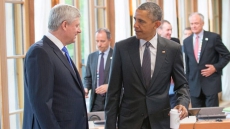VANCOUVER — If Vancouver has its way, the dozens of illegal pot shops scattered across the city will soon have business licences and health warnings hanging in their windows.
But the city's plans to ban edible products, forbid selling to minors and force stores located in troubled neighbourhoods to move are sparking criticism at a public hearing this week.
"I am a patient who does not want to smoke, as I value my lungs and health," said Brina Levitt, an owner of Green Penguin Delights, a company that makes marijuana products.
"I suffer from back pain and insomnia. My preferred method of medication is in ready-made edible form."
The debate began Wednesday, a day before the Supreme Court of Canada was to decide whether patients should be allowed to consume edible pot. More than 160 people are set to speak at the Vancouver hearing and it is expected to drag on for days.
The city is proposing new regulations to control the rapid growth of illegal marijuana dispensaries, which have multiplied from fewer than 20 to 94 over the past three years.
The regulations would include a new business licence category, a $30,000 fee and a requirement that stores be 300 metres away from schools, community centres and other pot shops.
Stores in certain neighbourhoods — the Downtown Eastside, Granville entertainment district and on Pender Street — would be forced to move or close. Individuals or agencies would be allowed up to five licences.
City manager Penny Ballem said the goal of the "precedent-setting" plan is to reduce youth exposure and serious crime.
"We have tried to achieve a really balanced approach here to allow people who need to access marijuana for medical issues to be actually able to do that, but to protect the public," she said.
"Some people think we're too strict and some people's input is that we're too lenient."
Connor Fesenmaier told council that his organization, Smart Approaches to Marijuana Canada, is boycotting the debate because the federal government has made it clear dispensaries are illegal.

"These hearings should not be taking place," he said. "It remains an open question as to whether or not civic servants or employees can be charged for conspiring to violate federal laws."
Among the many speakers who opposed the city's ban on edible products was Kirk Tousaw, a lawyer involved in the Supreme Court challenge. He warned Vancouver's policy would force people to buy brownies and cookies on the black market.
One speaker, Cheryl Rose, pleaded with council not to ban selling to minors. She said her 22-year-old daughter, Hayley, suffers from a severe form of epilepsy and began taking medical cannabis at 15.
Vancouver Coastal Health chief medical health officer Dr. Patricia Daly said marijuana affects brain development in youth and it may result in earlier onset of psychosis and schizophrenia in those with a genetic predisposition.
Selling marijuana over the counter is illegal in Canada — regardless of whether it's medical or recreational — and the federal government has strongly warned against the proposal.
The city has said that the federal government's strict medical marijuana laws have fostered the rise of dispensaries in Vancouver.
The hearing will resume Thursday evening.




